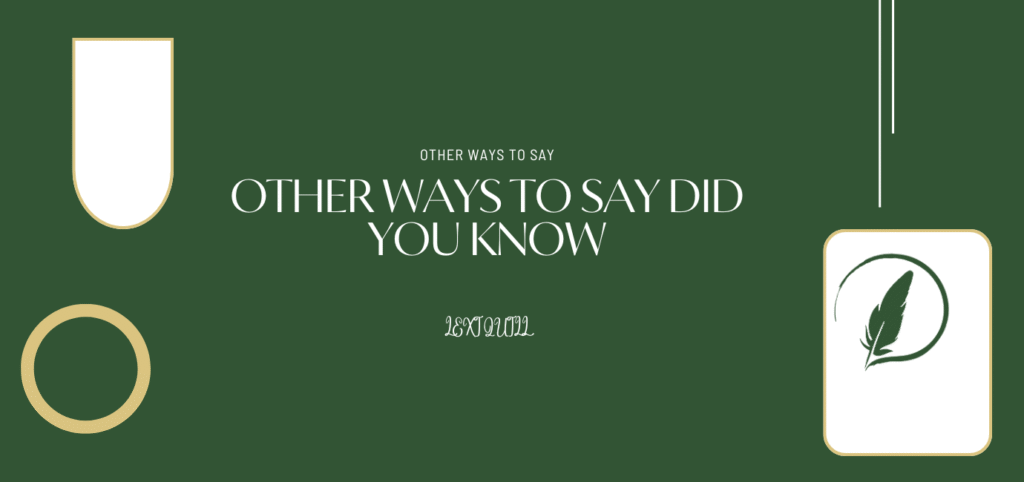“Did you know” is a popular phrase often used to share fascinating facts or draw attention to new information. While it serves its purpose well, using alternatives can enhance your communication style by making it more engaging, dynamic, and suited to different audiences and contexts.
Why Use Alternatives
Although “Did you know” is widely recognized and frequently used, relying on it too much can make your speech or writing sound repetitive. Incorporating a variety of phrases allows you to tailor your message to your audience, keep their attention, and convey your facts in more compelling ways. Whether you’re writing an article, delivering a speech, creating social media content, or simply having a conversation, these alternatives can add flair and variety to your language.
1. Have You Heard
This phrase adds a conversational tone and subtly encourages the listener to engage. It’s particularly effective when you’re sharing breaking news, updates, or something intriguing in everyday conversation.
Example: “Have you heard: The city is planning a new park in the downtown area. It’s designed to include walking trails, playgrounds, and an amphitheater.”
2. Were You Aware
A slightly more formal and polished option, “Were you aware” is suitable for business, academic, or professional contexts. It conveys respect and seriousness while still prompting curiosity.
Example: “Were you aware that our company has launched a new mentorship program designed to support employee growth and leadership development?”
3. Guess What
Lively and attention-grabbing, “Guess what” instantly sparks curiosity. It’s an excellent opener in casual conversation or when speaking to a younger or more informal audience.
Example: “Guess what: The universe is expanding faster than scientists originally thought, and it’s challenging our understanding of cosmology!”
4. Fun Fact
Quick and catchy, “Fun fact” is ideal for social media posts, informal presentations, or content aimed at general audiences. It prepares your audience for a bit of trivia or a surprising tidbit.
Example: “Fun fact: Honey never spoils. Archaeologists have found pots of honey in ancient Egyptian tombs that are still perfectly edible.”
5. You Might Find This Interesting
This phrase is gentle and respectful, inviting the audience to engage without sounding forceful. It’s a great lead-in for thoughtful or educational content.
Example: “You might find this interesting: Our brains produce enough electrical energy to power a low-wattage lightbulb.”
6. Let Me Tell You Something Cool
Energetic and enthusiastic, this phrase builds excitement. It’s excellent for storytelling, presentations to younger audiences, or any setting where you want to build anticipation.
Example: “Let me tell you something cool: Octopuses have three hearts, and their blood is blue due to a copper-rich protein.”
7. Ever Wondered
This rhetorical question is effective at setting up a mystery or a curiosity. It works well in articles, videos, or podcasts where you want to draw the listener into a topic.
Example: “Ever wondered why flamingos are pink? It’s actually because of the carotenoid pigments in the shrimp and algae they eat.”
8. Bet You Didn’t Know
Playful and teasing, this phrase implies that what follows will be surprising or obscure. It’s especially good for sparking interest and engagement.
Example: “Bet you didn’t know that a shrimp’s heart is located in its head—nature sure has a sense of humor!”
9. Here’s Something You Might Not Know
This phrase sets the stage for sharing insightful or lesser-known information. It’s warm, friendly, and informative, making it perfect for articles or explanatory content.
Example: “Here’s something you might not know: Bananas are classified as berries, while strawberries technically aren’t.”
10. It Might Surprise You To Learn
Slightly formal and highly effective, this phrase introduces unexpected facts in a way that builds curiosity. It’s excellent for professional writing or educational material.
Example: “It might surprise you to learn that water can boil and freeze at the same time under the right pressure conditions—a phenomenon known as the triple point.”
Final Thoughts
While “Did you know” is a go-to phrase for many, incorporating alternative expressions into your language helps diversify your communication style. Each of these phrases brings its own tone and energy, allowing you to match your message to your audience and context. Whether you’re aiming for formal, playful, or thought-provoking, choosing the right phrase can make your content more impactful and engaging.








